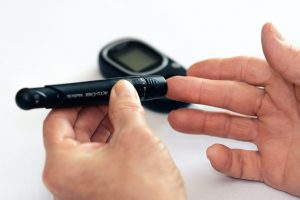 Did you know over 18 million Americans have sleep apnea? However, up to 80% of cases haven’t been diagnosed. Many people know they have some signs of the breathing disorder, like chronic snoring, but they don’t feel there’s any real danger of not seeking treatment. This couldn’t be further from the truth. Untreated sleep apnea is linked to several serious health issues, like heart disease, memory loss, and sleep deprivation, but those aren’t the only concerns. New research has found a connection between sleep apnea and prediabetes.
Did you know over 18 million Americans have sleep apnea? However, up to 80% of cases haven’t been diagnosed. Many people know they have some signs of the breathing disorder, like chronic snoring, but they don’t feel there’s any real danger of not seeking treatment. This couldn’t be further from the truth. Untreated sleep apnea is linked to several serious health issues, like heart disease, memory loss, and sleep deprivation, but those aren’t the only concerns. New research has found a connection between sleep apnea and prediabetes.
What is Sleep Apnea?
Obstructive sleep apnea (OSA) is the most common type of the disorder. It’s caused by the tissues in the back of the mouth or the tongue, creating an obstruction in the airway. As the muscles relax while sleeping, the obstruction can cause frequent interruptions in breathing. Each pause depletes your body of oxygen and disrupts your sleep cycle. Long-term, this can have potentially deadly complications for your health and quality of life.
Sleep Apnea and Prediabetes Risk
The Journal of Diabetes and Vascular Disease Research recently published an article highlighting a significant link between prediabetes and sleep apnea. Researchers at the University of Hertfordshire conducted a study using participants diagnosed with prediabetes, which occurs when the blood sugar is higher than normal.
Sleep apnea is known to make diabetic problems worse because it increases carbon dioxide in the blood. As a result, your body can become insulin resistant. Elevated blood sugar can be a strong indicator that diabetes is in your future if certain lifestyle changes aren’t made.
With at least 96 million Americans over 18 having prediabetes and the prevalence of sleep apnea, you might be at risk. If you’re prediabetic or you have signs of sleep apnea, a healthy lifestyle can safeguard your health from both conditions. With regular exercise, a balanced diet, and an oral appliance, you can manage your sleep apnea and keep diabetes at bay.
Sleep Soundly with an Oral Appliance
A CPAP is the most traditional method of treating OSA. It uses a stream of air pressure delivered through a mask worn over the mouth or nose to keep the airway open and prevent pauses in breathing. As an alternative, many patients prefer oral appliance therapy.
A custom-made device repositions the lower jaw and tongue to prevent them from blocking the airway. It’s a comfortable, effective method of maintaining your oxygen levels to protect your physical and mental health.
The FDA-approved treatment is effective in reducing up to 90% of symptoms in patients with mild-to-moderate cases of OSA. It’s not too late to invest in a healthier future. See if an oral appliance is right for you today.
About Dr. West
Dr. West has over 30 years of experience in dentistry and sleep medicine. After earning her dental degree from the University of Southern California Dental School, she focused her training on many advanced specialties, like sleep apnea therapy. Dr. West is a proud member of many professional organizations, including the American Sleep and Breathing Academy. If you need sleep apnea treatment, contact our office today to request an appointment.
